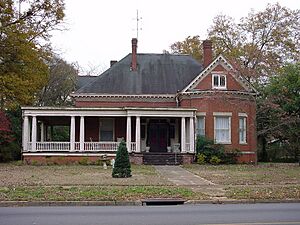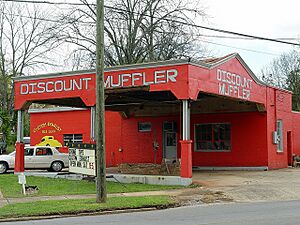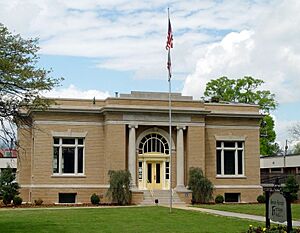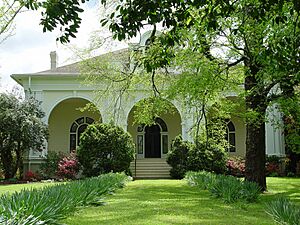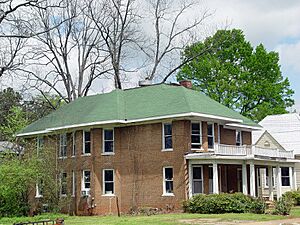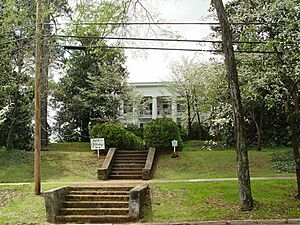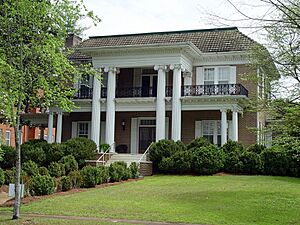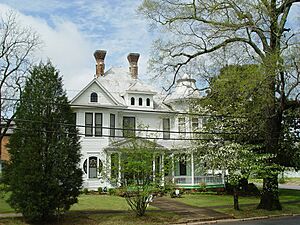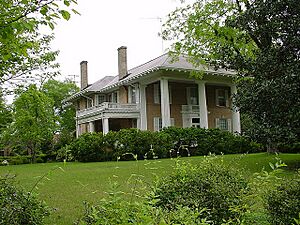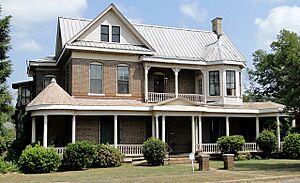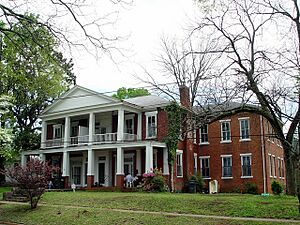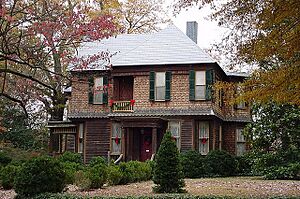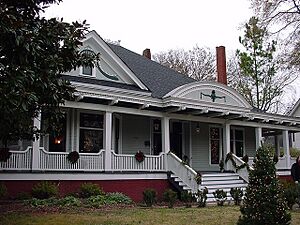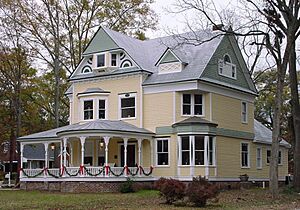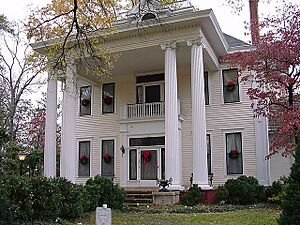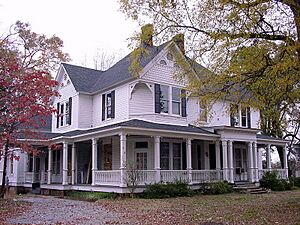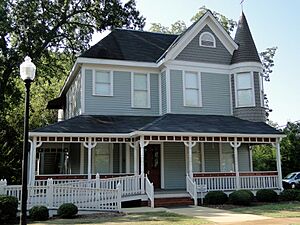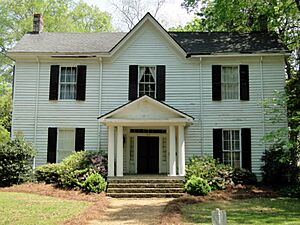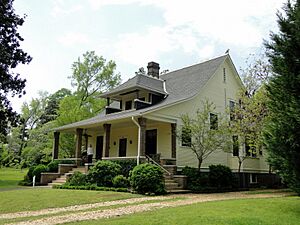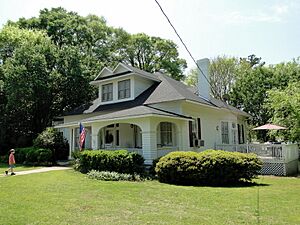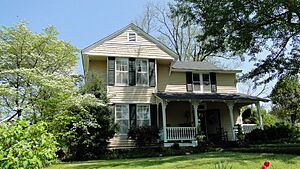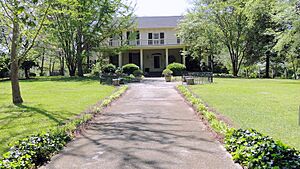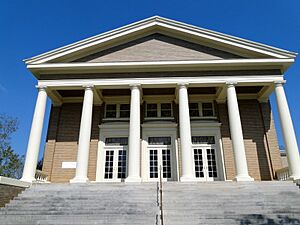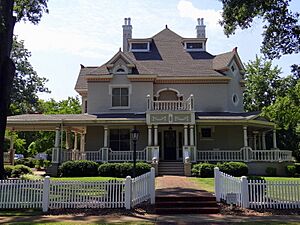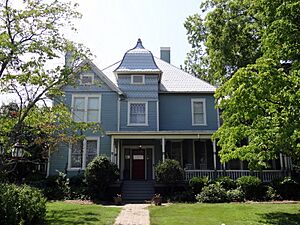Silk Stocking District (Talladega) facts for kids
Quick facts for kids |
|
|
Silk Stocking District
|
|
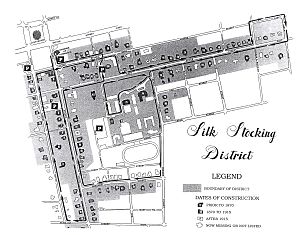 |
|
| Location | Roughly Bounded by Coffee, 2nd, McMillan, and Court Sts., Talladega, Alabama |
|---|---|
| Area | 113 acres (46 ha) |
| Architectural style | Colonial Revival, Classical Revival, Queen Anne, late Victorian |
| NRHP reference No. | 79000403 |
| Added to NRHP | December 13, 1979 |
The Silk Stocking District is a special area in Talladega, Alabama, where many old and important buildings are protected. It's like a neighborhood museum! This district was added to the National Register of Historic Places on December 13, 1979. This means it's officially recognized for its history and unique buildings.
The buildings here show off different styles, like Queen Anne, Classical Revival, Colonial Revival, and American Craftsman. The district covers about 113 acres (that's like 85 football fields!) and originally included 120 buildings that help tell its story.
Contents
- What Makes the Silk Stocking District Special?
- Famous Homes and Buildings
- Miss Willie's House: A Doctor's Home
- Talladega's First Service Station
- Jemison-Carnegie Public Library: A Place for Books
- Whitwood: A House with Log Cabin Roots
- Judge Vandiver House: Home of a Community Leader
- Plowman House: An Early Mansion
- Robbs House: A Remodeled Beauty
- Wren House: Another Lockwood Design
- Johnson Home: Neoclassical Style
- Clardy-Jemison Home: Built with Local Bricks
- Dr. John Vandiver House: Doctor and Druggist
- Johnson Harrison-Montgomery Home: A Medical Legacy
- Jim Ivey Home: Rebuilt After a Fire
- Ottis Cook Home: From Farm to Daycare
- Reynolds-Kent-McGehee Home: A Grand Mansion
- Boswell-Haywood Mansion: Another Lockwood Masterpiece
- Johnson-Weaver Home: Now Office Space
- Warwick Home: An Old Roadside House
- Henkel-King Home: Dutch Colonial Style
- Wilson-Whetsell Home: Caribbean Influence
- Chilton-Gordon-Townsend Home: Built with Strong Wood
- McAlpine Place: One of the Oldest
- First United Methodist Church: A Place of Worship
- Jemison-Purefoy Home: Now a Dormitory
- McElderry-Malone Home: A Banker's Residence
- Famous Homes and Buildings
- Images for kids
What Makes the Silk Stocking District Special?
The Silk Stocking District is known for its beautiful old homes and buildings. Many of these structures were built a long time ago, some even before the city of Talladega was officially founded! They show us what life was like in the past and how architecture changed over the years.
Famous Homes and Buildings
Many of the buildings in the Silk Stocking District have interesting stories. Let's explore some of them!
Miss Willie's House: A Doctor's Home
This house was built in 1907 for Dr. Samuel W. Welch and his wife, Ethel. Dr. Welch was a very important person in Alabama's health care. After his death, the house went to his daughter, Miss Willie Wallace Welch, who lived there until 1997. A famous architect named Frank Lockwood designed this home.
Talladega's First Service Station
Imagine a time when cars were new and exciting! This building, built around 1920, was Talladega's very first place where people could get gas and service for their cars. It shows how much our world has changed.
Jemison-Carnegie Public Library: A Place for Books
This beautiful library was built around 1906 thanks to a generous gift from Mrs. Lou McElderry Jemison and $10,000 from Andrew Carnegie. Carnegie was a famous businessman who helped build many libraries across the country. This library is now the Heritage Hall Museum, a place where you can learn about local history and art.
Whitwood: A House with Log Cabin Roots
The oldest part of Whitwood, built around 1836, is made from two old log cabins that were moved together! It's one of only two original log cabins left from Talladega's early days. Over time, the Whitson family added to it, making it the home you see today. It's still owned by the same family!
Judge Vandiver House: Home of a Community Leader
Built around 1912, this dark brick house belonged to Judge Jehu Wellington Vandiver. He was a lawyer, a writer, and even served as the mayor of Talladega. He built his home right behind his father's house, Dr. John Vandiver.
Plowman House: An Early Mansion
This impressive house was built around 1848 by George Paris Plowman. He moved to Talladega right after the town was founded in 1833. George Plowman was also elected mayor of Talladega and served in the state government.
Robbs House: A Remodeled Beauty
This home, built around 1840, got a big makeover in 1920 when Ida Wallis Elliott bought it. She was the founder of a very large travel agency! She added fancy marble porches and a marble staircase. The Robb Family bought the house in 1964.
Wren House: Another Lockwood Design
The E.B. Wren House was designed by the famous architect Frank Lockwood and built by Robert S. West between 1894 and 1903.
Johnson Home: Neoclassical Style
Dr. Hal Johnson had this house built in 1905, and it took two years to finish. It was also designed by Frank Lockwood and built by Robert S. West. It has a grand neoclassical style with tall columns and gray bricks.
Clardy-Jemison Home: Built with Local Bricks
This brick home was built around 1908 by W. Lyman Clardy and his father. They actually made the bricks themselves at their factory nearby! They built several other brick homes and businesses in the area.
Dr. John Vandiver House: Doctor and Druggist
Built in 1840 by Dr. John Vandiver and his wife Mary, this home was where Dr. Vandiver lived and practiced medicine for many years. They also owned a drug store in town. Later, in the 1940s, it was turned into apartments.
Johnson Harrison-Montgomery Home: A Medical Legacy
This unique Victorian home, built around 1890, looks like something you'd see in the northeastern United States. It was built by Seaborne Johnson, whose father founded the Alabama Institute for the Deaf and Blind. Later, Dr. Groce Harrison bought it and added a section for his medical office. His son, Tinsley Harrison, who was born here in 1900, became a very famous doctor and helped start the UAB medical school.
Jim Ivey Home: Rebuilt After a Fire
The Jim Ivey Home was first built in 1908. But after it partly burned down in 1913, it was rebuilt using the exact same plans! Robert S. West, a master builder, constructed it both times. Jim Ivey worked as a cashier at a local bank for many years.
Ottis Cook Home: From Farm to Daycare
Ottis Cook built this home in 1890. He owned a large farm that he rented out. After his family, the house became a children's daycare center called "Toddle Inn." It was empty for a while but has since been restored by its current owners.
Reynolds-Kent-McGehee Home: A Grand Mansion
This large mansion was ordered by banker J.F. "Poley" Reynolds in 1905–1906. Frank Lockwood was the architect, and Robert S. West was the builder. It used to have even more columns and a balcony, but these were removed to give it the Greek style you see today.
Boswell-Haywood Mansion: Another Lockwood Masterpiece
The Dr. Harry Boswell – Paul Haywood Mansion was also designed by the famous architect Frank Lockwood and built by Robert S. West.
Johnson-Weaver Home: Now Office Space
The Weaver family, who were early merchants in Talladega, lived in this home. It stayed in their family until recently, when the Alabama Institute of Deaf and Blind bought it and turned it into offices.
Warwick Home: An Old Roadside House
The Warwick-Paul Home was built in the 1830s along what became East Street South. It was built by a lawyer named Simeon Douglas and passed through several families over the years, with additions made to it.
Henkel-King Home: Dutch Colonial Style
William C. Henkel built this unique Dutch Colonial Revival style house in 1908. It still has its original fancy woodwork and even its old gas and electric lights!
Wilson-Whetsell Home: Caribbean Influence
Built in 1890 by Samuel Borders Wilson, a banker, this house has a Victorian style with a cool touch of Caribbean design.
Chilton-Gordon-Townsend Home: Built with Strong Wood
This house was built around 1834, the same year Talladega was founded! It used very large, hand-cut support beams and strong "heart pine" wood.
McAlpine Place: One of the Oldest
The McAlpine Place is one of the oldest homes in Talladega County, built even before the city itself! It started as a log cabin and was the center of a large farm. It faces one of the oldest roads in Alabama.
First United Methodist Church: A Place of Worship
The Methodist Church started meeting in Talladega way back in 1833. They moved to bigger buildings over the years, and construction on this beautiful church began in 1921. The first service in the new church was held on April 11, 1924.
Jemison-Purefoy Home: Now a Dormitory
Built in 1899 by E.S. Jemison, this home was later sold to Eva and Robert Purefoy, who owned the famous Purefoy Hotel in Talladega. Today, it serves as a dormitory for students at the Alabama Institute for the Deaf and Blind.
McElderry-Malone Home: A Banker's Residence
Hugh and Ruth McElderry built this lovely home in 1905. Hugh McElderry was an important citizen and a local banker. The Malone family bought the home in 1949, and it's still in their family today.
Images for kids
 | Leon Lynch |
 | Milton P. Webster |
 | Ferdinand Smith |


